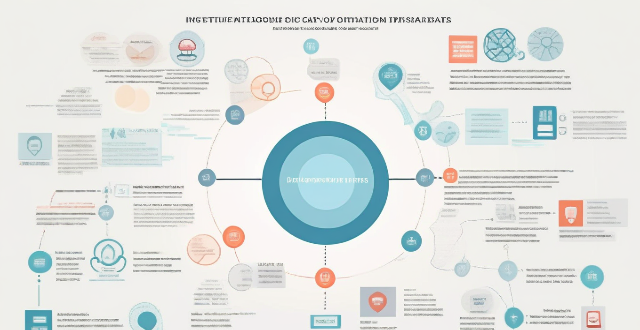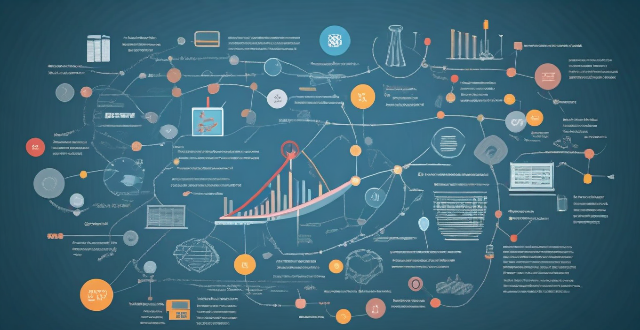Digital Analytics

How do you use data analytics to improve your digital marketing efforts ?
In the digital age, data analytics has become an indispensable tool for improving marketing strategies. By analyzing consumer behavior and preferences, businesses can tailor their marketing efforts to better suit their target audience, ultimately leading to increased engagement and conversion rates. To improve your digital marketing efforts using data analytics, follow these steps: 1. Identify Key Performance Indicators (KPIs) based on your marketing objectives such as increasing website traffic or boosting sales. 2. Collect and analyze data using tools like Google Analytics and social media analytics platforms to identify trends and areas for improvement. 3. Optimize your marketing strategy by adjusting content, creating targeted campaigns, and refining ad spend based on performance. 4. Continuously test and refine your approach through A/B testing and iterating based on results to optimize performance. By integrating data analytics into your digital marketing efforts, you gain valuable insights that allow you to make informed decisions and optimizations. This systematic approach not only enhances the effectiveness of your marketing campaigns but also helps you stay ahead in a competitive market. Remember, the key is to continuously monitor, analyze, and adapt based on the data you collect.

What is digital marketing ?
Digital marketing is the use of digital channels to promote products or services. Key elements include SEO, social media marketing, email marketing, content marketing, PPC advertising, affiliate marketing, online PR, data analytics, mobile marketing, and influencer marketing. Benefits of digital marketing include cost-effectiveness, targeted audience reach, measurable results, global reach, and personalization.

How can small businesses effectively use digital marketing ?
This text offers a comprehensive guide for small businesses to effectively utilize digital marketing. It outlines six strategies: developing a strong online presence through website, social media, and content marketing; leveraging local SEO by optimizing Google My Business listings and incorporating local keywords; investing in pay-per-click advertising with targeted ads and retargeting; harnessing email marketing by building lists and segmenting them for personalized communication; collaborating with influencers for expanding brand reach and credibility; and tracking performance using analytics tools, A/B testing, and customer feedback. The article emphasizes the importance of staying updated with digital trends and maintaining a consistent brand image across all platforms.

What are the benefits of using digital marketing for a business ?
The text discusses the advantages of digital marketing for businesses, which include improved targeting, cost-effectiveness, increased brand awareness, better customer engagement, and measurable results. It highlights that digital marketing allows companies to reach their ideal customers more effectively, save money compared to traditional marketing techniques, promote their brand consistently online, engage with customers on a deeper level, and track the performance of their campaigns for continuous improvement.

How has digital marketing changed the way businesses operate ?
Digital marketing has revolutionized the way businesses operate by providing increased reach, better insights, cost-effectiveness, improved engagement, and real-time results. It allows businesses to connect with a global audience through various digital channels, track customer behavior and preferences, control their marketing budgets, build stronger relationships with customers, and monitor the success of their campaigns in real-time. As technology continues to evolve, it will be interesting to see how digital marketing further impacts business operations in the future.

Can you recommend any online learning resources for digital marketing ?
The recommended online learning resources for digital marketing include Coursera, Udemy, HubSpot Academy, LinkedIn Learning, and Skillshare. These platforms offer courses on various aspects of digital marketing, such as search engine optimization (SEO), social media marketing, branding, customer engagement, data-driven marketing, content creation, paid advertising strategies, building a strong online presence, creating compelling visuals and copywriting for social media ads, inbound marketing methodologies, creating valuable content, developing a successful content strategy, core principles of digital marketing, advanced social media tactics, growth hacking techniques, email marketing fundamentals, and more. These resources provide learners with practical tools, frameworks, and real-world examples to apply in their work.

What are the benefits of using data analytics in education ?
Data analytics has become an increasingly popular tool in education, offering benefits such as improved student performance through personalized learning and early intervention, enhanced teaching practices with curriculum development and professional development, and better decision making with evidence-based decision making and transparency. As technology advances, data analytics is likely to become an even more integral part of the educational landscape.

How important is SEO in digital marketing ?
The text discusses the significance of SEO in digital marketing, highlighting its role in increasing visibility, cost-effectiveness, high conversion rates, long-term results, competitive edge, measurable outcomes, user experience improvement, and attracting local customers. It emphasizes that SEO is a crucial strategy for businesses to establish a strong online presence and compete effectively in the digital marketplace, contributing to both short-term and long-term success in digital marketing endeavors.

What is content marketing and how does it fit into a digital marketing strategy ?
Content marketing is a strategic approach to marketing that focuses on creating and distributing valuable, relevant, and consistent content to attract and engage a clearly defined audience. It involves the creation of various forms of content such as blogs, videos, social media posts, e-books, infographics, etc., which are designed to be helpful, informative, or entertaining for the target audience. The ultimate goal of content marketing is to convert prospects into customers by establishing a brand as a trustworthy authority in its field. Key elements of content marketing include quality content, targeted audience, strategic distribution, consistency, and call to action. Content marketing plays a central role in digital marketing strategy as it is often the foundation upon which other digital marketing activities are built. It integrates with different elements of digital marketing such as SEO, social media marketing, email marketing, pay-per-click advertising, conversion rate optimization, analytics and reporting, public relations and brand image, customer retention and loyalty, and multichannel experience.

How can educational institutions use data analytics to improve student outcomes ?
Educational institutions can use data analytics to improve student outcomes by identifying areas of focus such as performance tracking, curriculum analysis, and student engagement. Implementing data-driven strategies like personalized learning, predictive analytics, and resource allocation can further enhance student success. Continuous evaluation and collaboration are key to measuring success and making necessary adjustments.

How does data analytics improve team performance in sports ?
Data analytics has transformed sports by providing teams with valuable insights into player performance, training programs, game strategy, and predicting outcomes. By leveraging advanced technologies and statistical methods, coaches and players can make more informed decisions that lead to improved performance on the field or court. Key benefits of data analytics in sports include identifying key performance indicators (KPIs), optimizing training programs, enhancing game strategy, evaluating player performance, and predicting outcomes. Overall, data analytics is a powerful tool for teams looking to gain an edge over their competitors and achieve success in their sport.

What are the benefits of having a strong digital identity ?
The importance of a strong digital identity is highlighted in this text, which outlines several benefits including enhanced privacy and security, improved reputation management, greater control over online presence, better access to opportunities, and increased influence and credibility. The author emphasizes the need for individuals and organizations to manage and protect their digital identities to position themselves for success in today's interconnected world.

Can data analytics be used to personalize learning experiences for individual students ?
Data analytics is a powerful tool that can be used to personalize learning experiences for individual students by collecting data related to student performance, preferences and behaviors. This allows educators to tailor instruction to meet the unique needs of each learner. Data analytics can improve student outcomes, provide tailored instructional approaches, and use resources more efficiently. It can also identify student needs, design personalized learning plans and enhance teaching practices. By leveraging the power of data analytics, educators can better understand their students' needs, design effective learning plans, and enhance their teaching practices to promote improved outcomes for all learners.

What role does data analytics play in the development of sports equipment ?
Data analytics is crucial in the development of sports equipment. It helps manufacturers collect and analyze data from sensors, wearables, and performance tracking systems to gain insights into how athletes use their equipment. This information can be used for performance evaluation, athlete feedback, customization, injury prevention, and marketing and sales strategies. By leveraging data analytics, manufacturers can create more effective and efficient sports equipment that meets the needs of athletes and consumers alike.

What are some common challenges faced by educators when implementing data analytics in their classrooms ?
Educators face several challenges when implementing data analytics in their classrooms, including a lack of training and support, limited access to technology and data, time constraints, resistance to change, and privacy and ethics concerns. These challenges can make it difficult for teachers to effectively integrate data analytics into their teaching practices, potentially limiting the benefits that data-driven strategies can offer for improving student outcomes.

How can data analytics help identify areas where students may need additional support ?
Data analytics is a crucial tool in education as it helps identify areas where students may need additional support. It involves collecting and analyzing large sets of data to inform decision-making processes. Data analytics can be used to analyze student performance, track progress over time, and analyze behavior. Once areas for additional support are identified, personalized learning plans can be developed, collaboration between stakeholders can be facilitated, and continuous monitoring and adjustment can take place. Overall, data analytics provides valuable insights into student needs and promotes academic growth and success.

What are some best practices for integrating data analytics into educational curriculum planning ?
Integrating data analytics into educational curriculum planning can significantly improve the quality of education by enabling educators to make data-driven decisions. Here are some best practices for incorporating data analytics into your curriculum planning process: 1. Establish clear objectives and identify key performance indicators (KPIs) that will help you measure success in achieving these objectives. 2. Collect relevant data from appropriate sources, such as student performance records, attendance rates, or feedback surveys, and ensure its accuracy and completeness. 3. Analyze the data using suitable tools like spreadsheet software, specialized data analysis programs, or machine learning algorithms, and interpret the results to identify patterns, trends, and areas for improvement in your curriculum planning. 4. Implement changes based on the analysis by developing action plans outlining how you will use the insights gained to modify your curriculum planning and monitor their progress over time. 5. Involve stakeholders like teachers, administrators, parents, and students in the process, keeping them informed about how data analytics is used to enhance educational experiences and outcomes. 6. Continuously evaluate and refine your approach by regularly reviewing new data and adapting to changes in educational needs and advancements in data analytics technology.

What role does data privacy play in the use of data analytics in education ?
Data privacy is a crucial aspect of educational data analytics, ensuring the protection of student information, compliance with legal frameworks, and building trust among stakeholders. It encompasses measures such as maintaining confidentiality, integrity, and availability of data, adhering to regulations like FERPA, and obtaining explicit permission from students and parents. Challenges include potential misuse of data, bias, and discrimination. Best practices involve developing clear policies, implementing technical measures like encryption and access controls, and educating staff and students about their rights. By addressing these challenges and implementing best practices, educational institutions can harness the power of data analytics while safeguarding the privacy rights of their students.

How does digital identity impact personal privacy and security ?
The article discusses the impact of digital identity on personal privacy and security. It highlights the risks associated with data collection, cybercrime, surveillance, phishing attacks, social engineering attacks, and ransomware attacks. The article emphasizes the importance of protecting digital identity by using strong passwords, enabling two-factor authentication, and being cautious when sharing sensitive information online.

How is digital technology transforming the energy market ?
Digital technology is revolutionizing the energy market by improving efficiency, enhancing renewable energy sources, facilitating decentralized energy production, enabling smart buildings and homes, and promoting transparency and accountability. This transformation is crucial for meeting the increasing global demand for energy while addressing environmental concerns.

To what extent do technological advancements (like improved equipment and analytics) influence sports performance at the highest level ?
Technology has significantly impacted sports performance through improved equipment, advanced analytics, and enhanced training methods. Lightweight materials, aerodynamic designs, and customized gear have boosted athlete performance. Safety measures and recovery tools have minimized injuries and accelerated healing. Smart devices and simulation tools aid efficient training. Advanced analytics aid in performance tracking, strategy development, and team management. However, these advancements may create disparities between teams with unequal access to technology. They also raise debates on skill versus technology's role in sports. Despite concerns, technology enhances fan engagement through interactive experiences and data visualization. As technology advances, governing bodies must ensure equitable access and maintain fair competition while embracing its role in shaping the future of sports.

What are the challenges faced by businesses in digital marketing ?
The text discusses the various challenges faced by businesses in digital marketing, including staying up-to-date with technology, data privacy and security concerns, generating measurable results, content creation and management, search engine optimization (SEO), social media marketing, customer acquisition and retention, adapting to consumer behavior, budgeting and resource allocation, and lack of expertise. Addressing these challenges proactively can improve digital marketing efforts and achieve better results online.

What role does social media play in digital marketing ?
The Role of Social Media in Digital Marketing Social media has become an essential component of digital marketing, offering businesses numerous opportunities to promote their products and services online. Here are some key ways social media influences digital marketing: 1. Brand Awareness and Visibility - Increased Exposure: Social media platforms offer businesses a chance to reach a wider audience, increasing brand visibility. - Targeted Ads: Platforms like Facebook and Instagram allow for targeted advertising, ensuring that the right message reaches the right people. - Hashtags and Trending Topics: By participating in trending topics and using relevant hashtags, brands can increase their visibility and join conversations that align with their values. 2. Customer Engagement and Interaction - Direct Communication: Social media provides a platform for direct communication between businesses and customers, fostering better relationships. - Instant Feedback: Businesses can receive immediate feedback from customers, helping them improve products or services quickly. - Loyalty and Advocacy: Engaged customers often become brand advocates, promoting the business through word-of-mouth on their own social networks. 3. Content Marketing - Rich Media: Social media allows for various forms of content, including images, videos, and articles, making it easier to engage users. - Storytelling: Brands can use social media to tell stories that resonate with their audience, creating an emotional connection. - Influencer Collaborations: Partnering with influencers can help extend a brand's reach and credibility among specific demographics. 4. Lead Generation and Conversion - Promotions and Discounts: Social media is an effective channel for promoting sales and discounts, driving traffic to websites or physical stores. - Contests and Giveaways: These activities not only generate excitement but also encourage user-generated content, further expanding a brand's reach. - Retargeting: Through retargeting ads, businesses can remind potential customers of their interest in a product or service after they've interacted with the brand online. 5. Data Collection and Analysis - Insights and Analytics: Most social media platforms provide analytics tools that offer valuable insights into customer behavior and preferences. - Audience Segmentation: By analyzing social media data, businesses can segment their audience and tailor their marketing efforts accordingly. - Competitive Analysis: Social media also allows businesses to monitor competitors' activities and strategies, helping them stay ahead in the market. In conclusion, social media plays a multifaceted role in digital marketing, from enhancing brand visibility to facilitating customer interactions and generating leads. As technology continues to evolve, so will the ways in which social media influences digital marketing strategies.

What are the latest trends in digital marketing ?
The article discusses the latest trends in digital marketing, including personalization, voice search optimization, video marketing, influencer marketing, chatbots and AI, and social media stories. Personalization involves using data analytics to create personalized experiences for customers, while voice search optimization requires optimizing content for voice search by using long-tail keywords and natural language. Video marketing is a popular trend that involves engaging with the audience through video content, while influencer marketing allows brands to tap into an influencer's loyal following to promote their products or services. Chatbots and AI are being used to automate customer service tasks and provide personalized recommendations to customers. Social media stories have become a popular way for brands to connect with their audience through short-form content that disappears after 24 hours. The article concludes that staying up-to-date with these trends is essential for any business looking to succeed online.

What is digital identity and why is it important ?
The text discusses the concept of digital identity, which encompasses all online information about an individual or entity. It includes personally identifiable information (PII), online accounts, digital footprints, and behavioral data. The importance of digital identity is highlighted in terms of security and privacy, trust and verification, personalization and convenience, and reputation management. Managing one's digital identity is crucial for protecting against fraud, preserving privacy, ensuring secure online transactions, accessing services, enjoying tailored experiences, streamlining processes, and maintaining a positive online presence.

How does digital identity verification work in online transactions ?
Digital Identity Verification in Online Transactions: A Comprehensive Guide Digital identity verification is a crucial aspect of online transactions, ensuring the authenticity and security of users. This process involves collecting personal information, verifying it against reliable sources, employing multi-factor authentication, using encryption techniques, and implementing monitoring systems to detect fraudulent activities. By following these steps, businesses can protect their customers' sensitive data and maintain trust in the digital marketplace.

How can I protect my digital identity online ?
In today's digital age, protecting your online identity is crucial. Cybercriminals are constantly on the lookout for ways to exploit personal information for financial gain or other malicious purposes. Here's how you can safeguard your digital identity: Use strong and unique passwords, enable two-factor authentication (2FA), keep software up to date, be cautious with personal information, use secure networks, monitor your online presence, and educate yourself about cybersecurity. By following these steps, you can significantly enhance the protection of your digital identity and reduce the risks associated with being online.

How has the rise of digital banking affected the need for financial literacy ?
The rise of digital banking has significantly affected the need for financial literacy. As more and more people turn to online banking platforms, it becomes essential for them to have a basic understanding of financial concepts and practices. In this article, we will explore how digital banking has influenced the importance of financial literacy and what individuals can do to improve their financial knowledge.

Which digital resources are most helpful for remote learning ?
Remote learning has become increasingly popular due to the COVID-19 pandemic. With the help of digital resources, students can continue their education from home. Here are some of the most helpful digital resources for remote learning: Online Learning Platforms, Video Conferencing Tools, Virtual Whiteboards, Online Libraries, Interactive Learning Tools, and Communication Tools. These resources provide students with access to high-quality educational content, interactive features, and collaborative tools that enhance the learning experience. By utilizing these resources, students can continue their education from home while staying engaged and motivated.

How do I create a secure digital identity for myself ?
Creating a secure digital identity is crucial in today's digital age. Here are some steps you can follow to create a secure digital identity: choose a strong password, enable two-factor authentication, keep your software up-to-date, be cautious with personal information online, use encryption tools, and monitor your online presence. By following these steps, you can protect your personal information and reduce the risk of identity theft or cyber attacks.